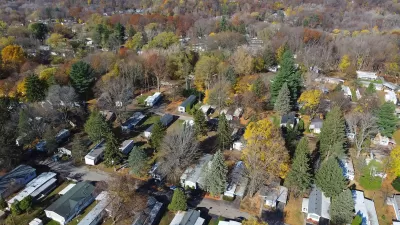It’s time to rethink the negative stereotypes and acknowledge the key role mobile home parks can play in solving the affordable housing crisis.

Stereotypes about manufactured housing are stifling a robust source of affordable housing. This is what Zachary Lamb, Jason Spicer, and Linda Shi argue in The Conversation, pointing out that “many people, including urban planners and affordable housing researchers, see manufactured housing parks as problems” rather than one solution to the housing crisis.
The authors outline and debunk four major stereotypes about mobile homes:
- “Manufactured housing is shoddy:” In fact, manufactured homes have to meet federal safety standards, and “Many quality problems associated with manufactured housing arise from home installation, park maintenance and infrastructure issues.”
- Manufactured housing is exploitative: While land leases can put residents at the mercy of landlords, as we have covered before, Resident Owned Communities offer a model that puts ownership and control in the hands of the people who live in the parks.
- Lack of density: The density of mobile home parks is often higher than surrounding neighborhoods, and 61 percent of manufactured housing is located in urban areas.
- Mobile home parks are isolated: While this is in some cases true, the authors point out that “this pattern applies to most U.S. residential neighborhoods built since World War II, including gated communities and cul-de-sacs,” and mobile home parks are often further isolated by local zoning regulations.
The article outlines the real obstacles to manufactured housing: an eagerness on the part of local officials to convert the land to “better” uses, the purchase of mobile home parks by investors, climate change and extreme weather, and aging infrastructure.
Some states are implementing solutions to make manufactured housing communities more sustainable, resilient, and affordable. At the federal level, “The Biden administration’s 2022 housing plan includes extensive support for manufactured housing parks.” The authors suggest coupling current efforts with legislation that expands tenant protections and supports opportunities for resident-owned and cooperative models to support more stable and resilient communities.
FULL STORY: Debunking stereotypes about mobile homes could make them a new face of affordable housing

Alabama: Trump Terminates Settlements for Black Communities Harmed By Raw Sewage
Trump deemed the landmark civil rights agreement “illegal DEI and environmental justice policy.”

Planetizen Federal Action Tracker
A weekly monitor of how Trump’s orders and actions are impacting planners and planning in America.

The 120 Year Old Tiny Home Villages That Sheltered San Francisco’s Earthquake Refugees
More than a century ago, San Francisco mobilized to house thousands of residents displaced by the 1906 earthquake. Could their strategy offer a model for the present?

In Both Crashes and Crime, Public Transportation is Far Safer than Driving
Contrary to popular assumptions, public transportation has far lower crash and crime rates than automobile travel. For safer communities, improve and encourage transit travel.

Report: Zoning Reforms Should Complement Nashville’s Ambitious Transit Plan
Without reform, restrictive zoning codes will limit the impact of the city’s planned transit expansion and could exclude some of the residents who depend on transit the most.

Judge Orders Release of Frozen IRA, IIJA Funding
The decision is a victory for environmental groups who charged that freezing funds for critical infrastructure and disaster response programs caused “real and irreparable harm” to communities.
Urban Design for Planners 1: Software Tools
This six-course series explores essential urban design concepts using open source software and equips planners with the tools they need to participate fully in the urban design process.
Planning for Universal Design
Learn the tools for implementing Universal Design in planning regulations.
Clanton & Associates, Inc.
Jessamine County Fiscal Court
Institute for Housing and Urban Development Studies (IHS)
City of Grandview
Harvard GSD Executive Education
Toledo-Lucas County Plan Commissions
Salt Lake City
NYU Wagner Graduate School of Public Service





























